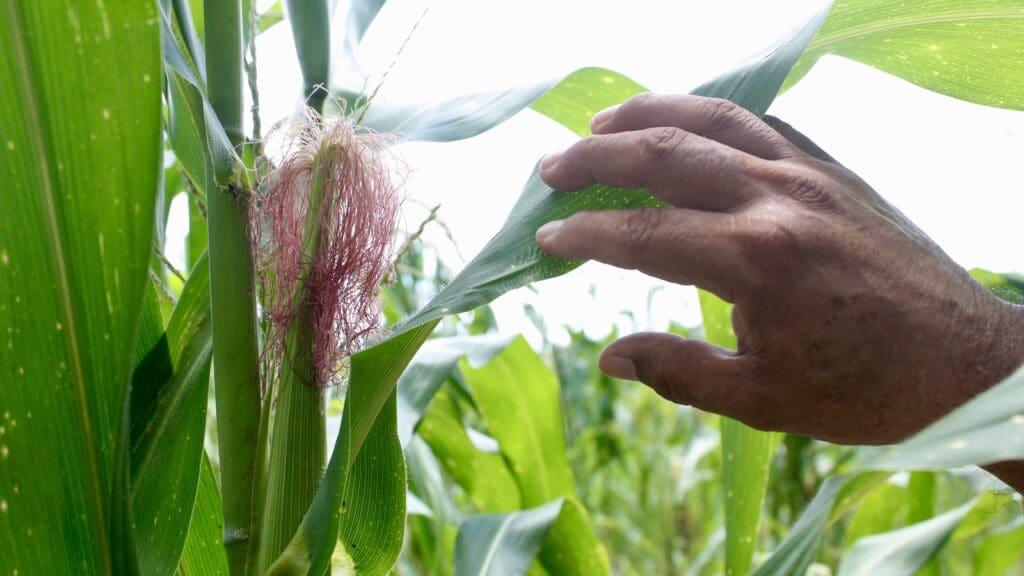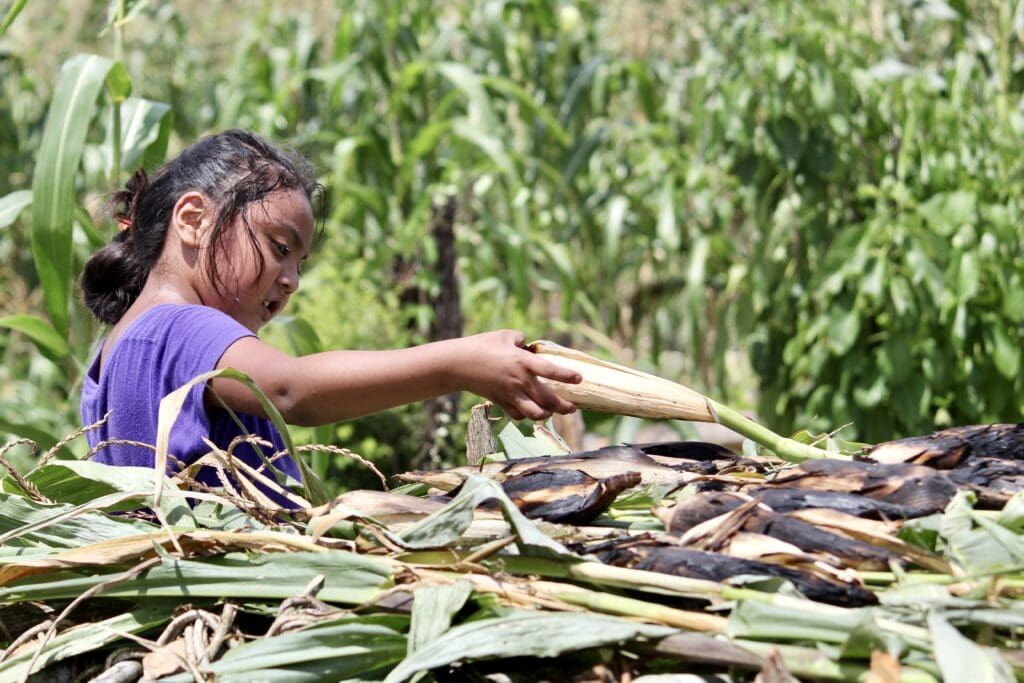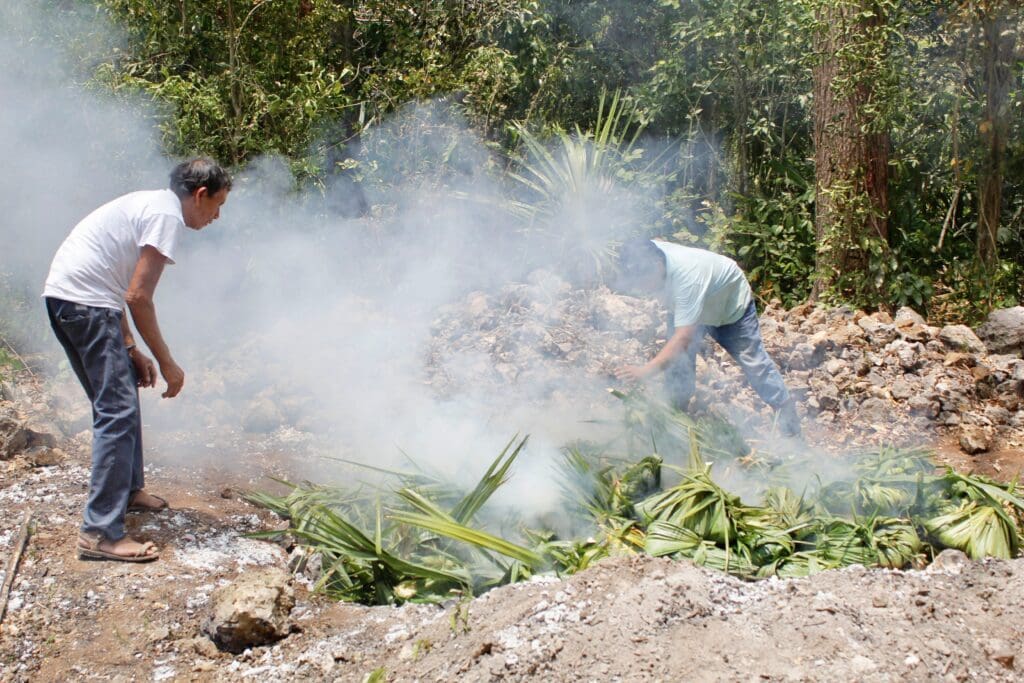
For millennia, Indigenous cultures in Mesoamerica have relied on an agricultural system known as the milpa. Milpa involves the growing of corn, beans, and squash, often with other crops and trees. Together, they enter into a harmonious, symbiotic relationship. Strong corn stems support climbing beans. Bean plants transform nitrogen from the atmosphere into soil nutrients. And the large leaves of squash plants shade the soil, keeping moisture in and weeds out. The milpa not only maximizes crop yields but is the basis for a nutrient rich diet.
In light of 21st century food security challenges, there’s much we can learn from the lineage holders of this ancient practice, according to Erika Diaz-Almeyda, a microbial ecologist and assistant professor at California State University San Marcos. Erika received a 2021 Mind & Life Francisco J. Varela Grant to study the ecological wisdom of Mayan milpa growers and how Indigenous contemplative practices can inform sustainable food production today.
With climate change driving environmental emergencies globally, Erika and other researchers are looking to learn from ancient cultures that coped with similar threats. “I believe that traditional ecological knowledge is needed to solve our current environmental challenges,” says Erika. “Milpa builds communities, fosters a sense of belonging, and teaches human-earth connections.”
“I believe that traditional ecological knowledge is needed to
solve our current environmental challenges.”
The lessons of the milpa extend far beyond agricultural productivity, with profound relevance for how humans interact with nature and each other. “We live in a time where everything is urgent,” says Erika. “We tend to want the highest yield, the highest production. It’s all about profit.” By contrast, implicit in the Mayan milpa is the preservation of the ecosystem for future generations, with the entire community engaged in ceremonies. “What these acts are doing is bringing awareness to our interconnectedness,” she explains. “Everyone—including bugs, ants, and birds—has a place in the community.”

Originally from Mexico City, Erika credits her grandmothers, who grew up in rural Mexico, with inspiring her interest in science and nature. “My grandmothers had a respect for nature and plant medicine. There was something contemplative about it I couldn’t quite describe.”
The first person in her family to attend college, Erika studied biology as an undergraduate and completed her master’s in marine science and limnology at Universidad Nacional Autonoma de Mexico in the Yucatán. There she learned the importance of a holistic approach to science that pays close attention to the people caring for a given ecosystem. She later moved to the U.S. to pursue a doctorate in biology at Pennsylvania State University. Throughout she maintained a passion for contemplative science and appreciation of diverse perspectives and ways of knowing.
An Embodied Ethnoecology Approach
Through the grant, Erika and her team are studying the contemplative practices associated with the milpa in Mayan communities in Mexico’s Yucatán province. Such practices are viewed as faith-based and therefore not central to understanding how milpa is grown. By contrast, Erika argues that the milpa wisdom keepers have long understood the causal relationship between their rituals and the sustainable results of their harvest. Such practices are integral, she posits, to the agroecological expertise of the Mayan farmers.
Using an embodied ethnoecology approach, the team is documenting the ecological knowledge of Mayan milpa growers, along with the ceremonies they lead. This includes their ability to tune into subtle shifts in their natural environment—like the sound of cicadas when rain is imminent. “They [local farmers] know the landscape,” says Erika. “They’re managing the environment—not just for humans—but for every being in the jungle.”
“They [local farmers] know the landscape. They’re managing the
environment—not just for humans—but for every being in the jungle.”
During the grant’s first phase, Erika’s team identified local collaborators with whom to design and implement interviews with Mayan wisdom keepers and participants in formal Milpa practices and rituals. The process of conducting and translating interviews is a painstaking one, requiring team members who are fluent in English, Mayan, and Spanish.
The team sought to identify rituals of importance, their sequencing, and purpose. These included the saka’ used to ask permission to do a controlled burn to prepare the land; the Cha’a’chaak, a request for rain (literally “rain calling”); and the u janli k’ool, which offers thanks for the first harvest and other blessings received throughout the year. The team also learned how knowledge was shared among participants and the use of milpa rituals as a form of environmental education.

Preliminary results reveal diverse biological data—such as specific bird songs and the presence of certain insects—during these agricultural celebrations. Interviewees also commented on changes in the local ecosystem due to climate change, and the difficulty of maintaining interest in traditional practices among the community. In the months ahead, the team will conduct additional in-depth interviews and analyze the data they collect.
The ecological wisdom and Indigenous contemplative practices studied through the grant will eventually be captured in a book—written in Spanish, Mayan, and English—and distributed within local communities. With the ways of Mayan milpa growers increasingly threatened by climate change, 21st century lifestyles, and loss of language, it’s more important than ever to preserve this knowledge, says Erika, while sparking pride and engagement among younger generations. “We need to figure out how to live in a world where different ways of knowing and living fit,” she says. “We can’t continue with business as usual.”
Suggested Resources
- Read about the impact of Mind & Life’s Francisco J. Varela Grants over two decades
- Learn how one Mind & Life Contemplative Changemaking grantee is working to indigenize mindfulness to support the well-being of Native American youth
- Find out about efforts to bring Indigenous ways of knowing into conversation with Western approaches in a Mind & Life podcast interview with contemplative scholar and Indigenous activist Yuria Celidwen
- Explore the Power of Nature-based Contemplative Practices for Inner Peace and Collective Well-being
- Learn why we need contemplative practices that engage everyone in upholding Nature’s law of interdependence in a Mind & Life Insights essay by Dekila Chungyalpa, Director of the Loka Initiative


